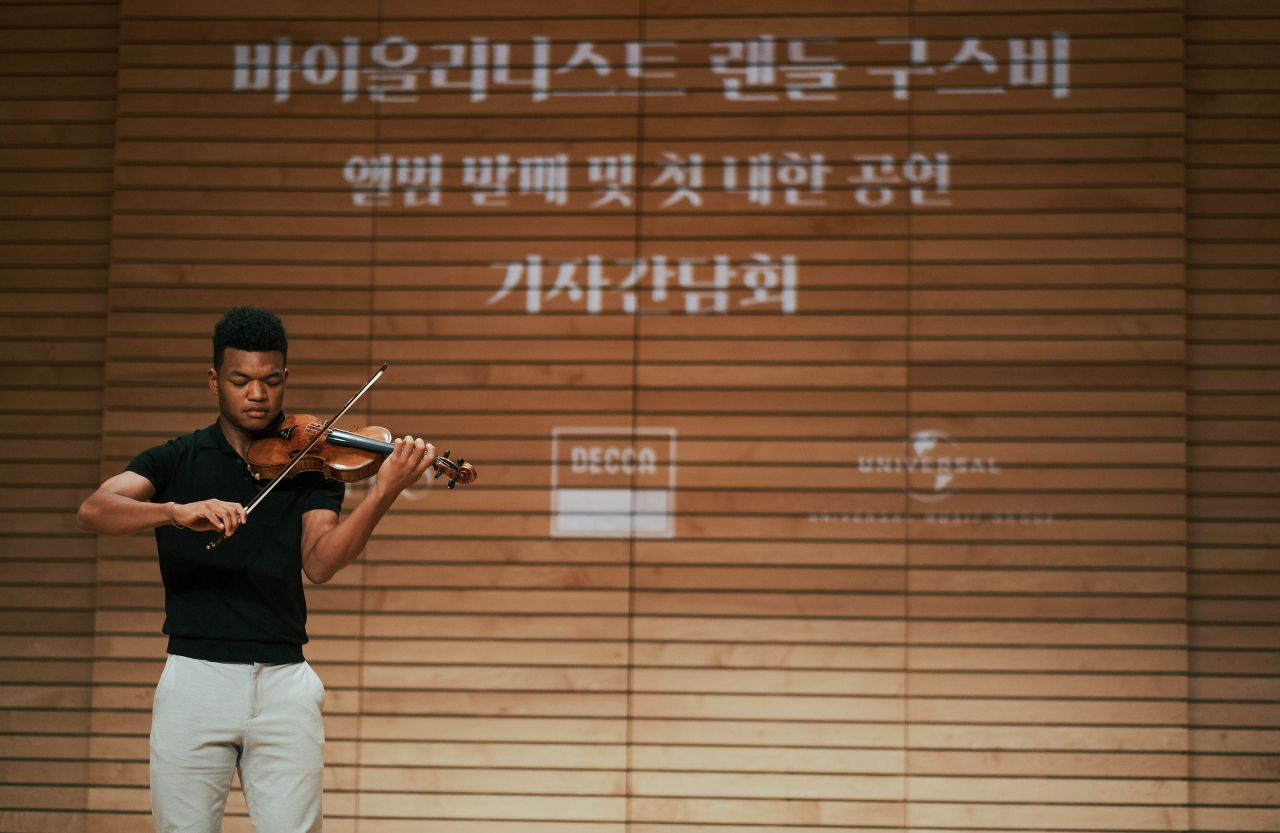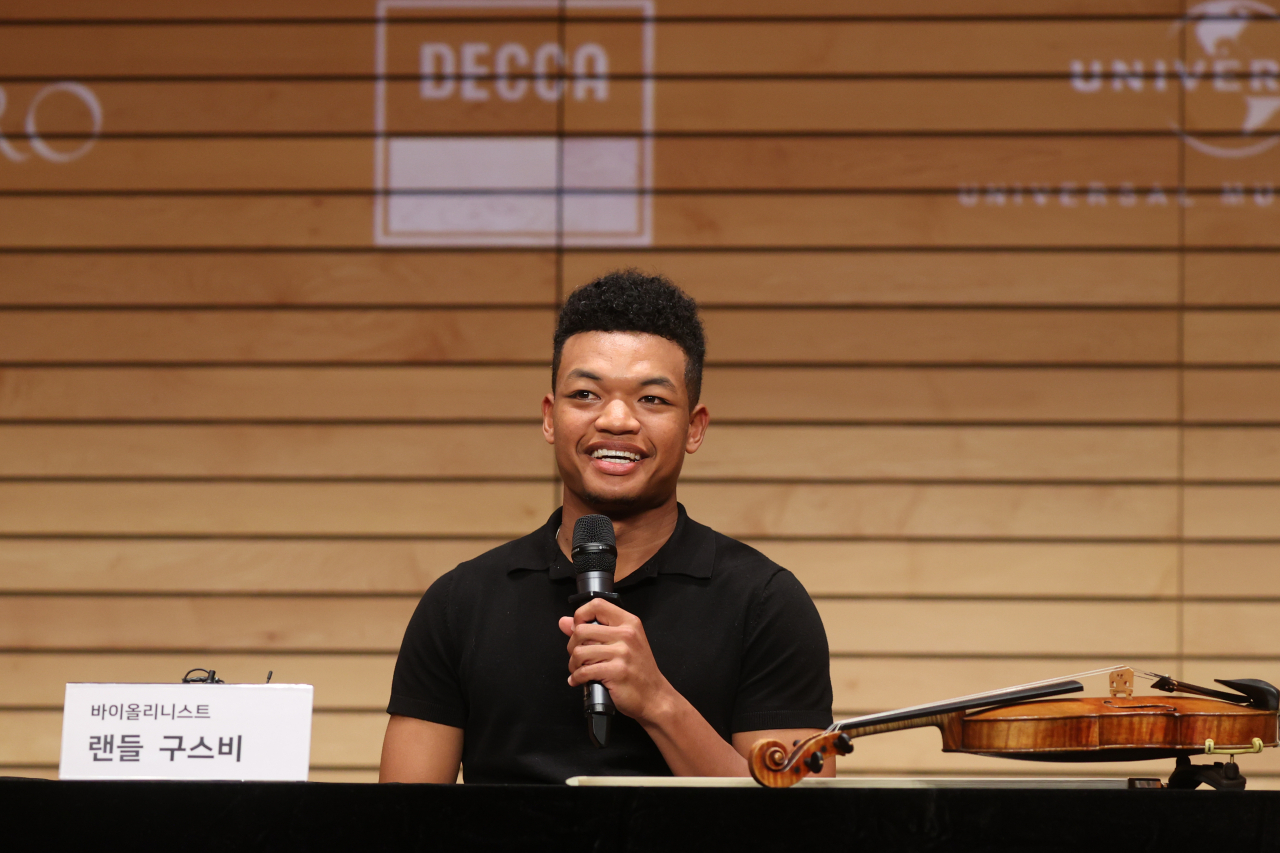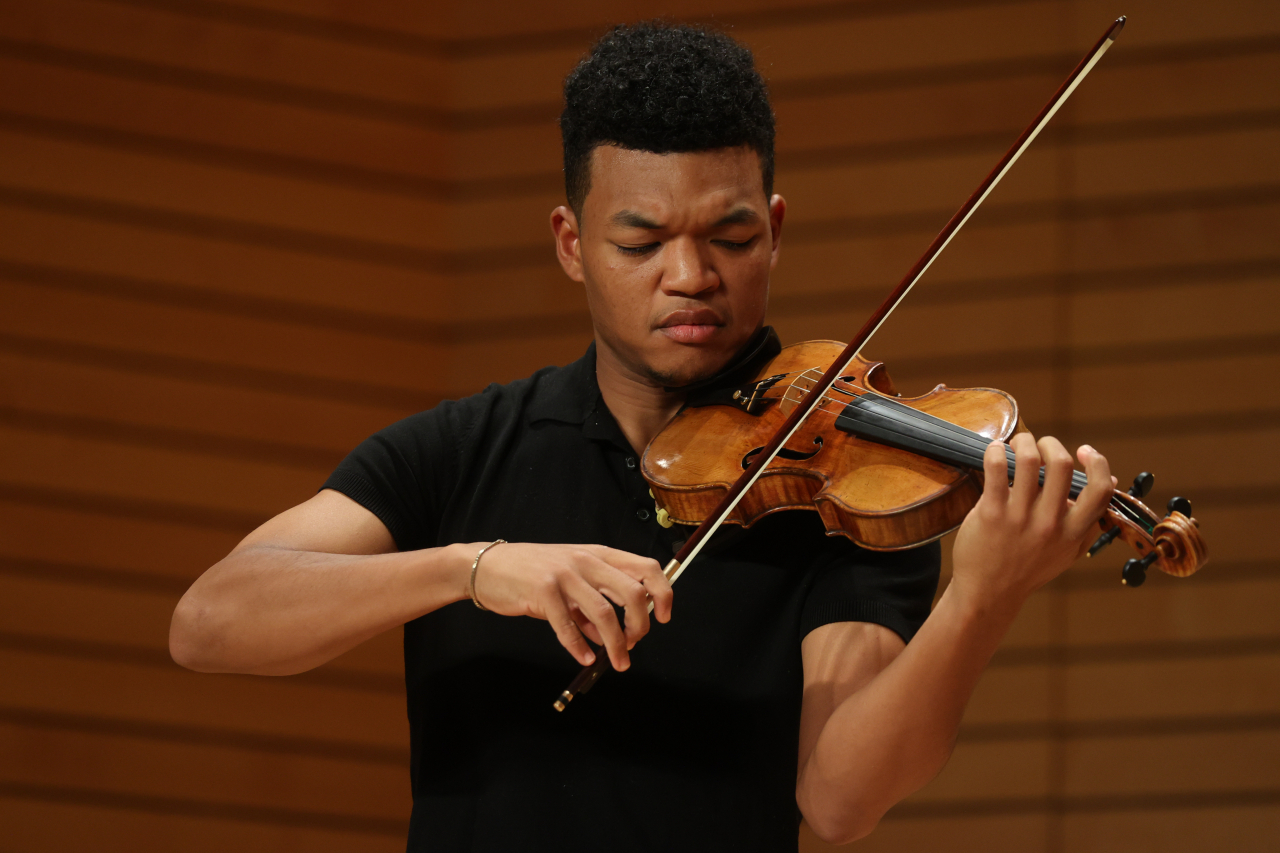 |
American violinist Randall Goosby performs during a press conference at the Leeum Museum of Arts, run by the Samsung Foundation of Culture, Monday. (Yonhap) |
American violinist Randall Goosby had a profound revelation at the age of 14: Composers could be Black. That was seven years after he had started playing the violin.
Goosby, the son of an African American father and a mother who is a third-generation Korean who grew up in Japan, was troubled by the realization, which only intensified during the COVID-19 pandemic.
“There was a lot of attention on the divide between races in America and I think in classical music that divide is as clear as it is anywhere else,” he told reporters during a press conference Monday at the Leeum Museum of Art, run by the Samsung Foundation of Culture.
The violinist, who studies under Itzhak Perlman, is in the country this week for Korean debut recitals at the Asia Culture Center in Gwangju on Tuesday and Lotte Concert Hall in Seoul on Thursday. He will showcase pieces he chose taking into consideration the connections and influences between composers: Lili Boulanger’s "Deux Morceaux," Ravel's Violin Sonata No. 2 in G Major, William Grant Still's Suite for Violin and Piano and Beethoven's Violin Sonata No. 9 in A Major, Op. 47 "Kreutzer."
Still is a groundbreaking 20th-century American composer often called the "dean of Afro-American composers." Ravel's Violin Sonata No. 2 in G Major is a chance to feel the influence of American music -- blues in particular -- on the French composer. Beethoven's "Kreutzer" highlights the lesser-known relationship between the composer and George Bridgetower, a British composer of African descent. Initially dedicated to Bridgetower, the violin sonata was later dedicated to another violinist named "Kreutzer," who never played the piece, after the relationship between Bridgetower and Beethoven deteriorated.
 |
American violinist Randall Goosby speaks during a press conference at the Leeum Museum of Arts, run by the Samsung Foundation of Culture, Monday. (Yonhap) |
During the pandemic, in support of the Black Lives Matter movement, Goosby did a project “sharing and highlighting and celebrating the music of Black composers, who are sometimes excluded intentionally in classical music” with his first album, “Roots,” which came out in June 2021.
“This was an opportunity for me to change and to make a small mark on what I think should be the future of classical music,” he said.
Goosby's second album, his first concerto album recorded with the Yannick Nezet-Seguin-led Philadelphia Orchestra, shed light on music by German composer and violinist Max Bruch and American composer and pianist Florence Price. The album was released Monday in South Korea.
Performing lesser-known music offers a blend of challenges and excitement. The initial hurdle lies in the discovery process, as there may be instances where no sheet music exists because the composers had not been fortunate enough to develop a partnership with a publishing house, he said. Some compositions survive only as manuscripts.
Bringing these pieces to life is exciting because he can be more creative and free without other references, the violinist said.
Goosby's trusty playing companion is “Woods,” a 1708 Strauss violin on loan from the Samsung Foundation of Culture since January this year, nicknamed after Tiger Woods, a hero of the sport the violinist loves.
While on tour, Goosby has also brought along his golf gear, hoping for a chance to play the sport he has been enjoying for the last five years. He discovered that golf and playing the violin require the same kind of focus and mental strength.
“In both golf and music -- and performance specifically -- there are elements of the environments around you that you cannot predict and you cannot control, such as temperature or you know how the audience is behaving, or how you're feeling, you know, whether you're feeling a little tired, you are sick -- all of these things influence how you perform,” he explained.
“But I think with golf, I've seen amongst all of the frustrating times that I've had, there is value in staying in the present moment. As soon as you start getting distracted thinking about something that has happened in the past, it takes away from what you can do in the present moment," he said.
“Golf is a way for me to escape the realities of life and work, but at the same time, it requires the same kinds of skills that I need for performance, so I'm able to practice without practicing,” he added.
The young violinist loves performing, and wants to be a performer for as long as possible. At the same time, he hopes to make classical music more inviting and accessible for everyone.
"My biggest goal with music is to continue this journey of making classical music more inviting and more welcoming to people of all backgrounds and ages," he said, adding that he aspires to create educational programs.
"It feels like big, serious ideas -- something that will take a lot of time -- but I think that is, for me, the bigger purpose for my music."
 |
American violinist Randall Goosby performs during a press conference at the Leeum Museum of Arts, run by the Samsung Foundation of Culture, Monday. (Yonhap) |